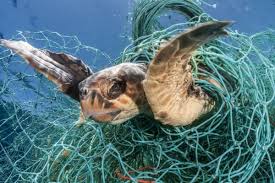In September 2018, we were delighted to learn that Canada had signed on to the Global Ghost Gear Initiative (GGGI). This is a huge win for marine animals off our coasts. Though the project still has only a small group of national governments (currently 15, with a listing below), it also involves a number of other partners in private enterprise, NGOs and academia. This means that Canada has now made a formal commitment to collaborate with these other stakeholders in developing solutions which will reduce the harmful impacts of ghost gear. Given the importance of this issue, we hope that other countries see the value of joining, and soon.
Ghost gear refers to any fishing gear that has been abandoned, lost or for any reason discarded. It is perhaps the single most harmful form of debris we leave in the oceans. This can happen due to severe weather, snags beneath the surface, or getting entangled with other gear or other vessels. Less often, but still all-too-often it is intentionally discarded when it’s determined that no other options are available.
Ghost gear is found everywhere in the Earth’s seas, and accounts for as much as 70% of the macro-plastics in the ocean. Its effect on marine life is devastating. Whales, dolphins, seals, turtles, and many others get trapped in it, resulting in the mutilation and death of tens of thousands every year.
Josey Kitson, Executive Director for World Animal Protection, stated as follows:
“Canada’s agreement to sign on to this initiative is a game changer. Our country has the longest total coastline in the world and Canada is sending a clear message that it is a leader in tackling ghost gear, protecting vulnerable species, improving the health of marine ecosystems, as well as safeguarding fishing industry livelihoods.”
We are pleased to see that our government has recognized that the time to act is now, and that we as a nation are prepared to address the significant environmental impacts of ghost gear. Working with partners to find innovative ways to rid the oceans of this debris is key to improving the health of marine ecosystems, and thus giving ourselves a shot at one day having sustainable fisheries.
For The Orca’s Voice, Anna, Canadian Cetacean Alliance
Listing of national government signatories to GGGI:
- Belgium
- Canada
- Dominican Republic
- Montserrat
- Netherlands
- New Zealand
- Norway
- Palau
- Panama
- Samoa
- Sweden
- Tonga
- Tuvalu
- United Kingdom
- Vanuatu



Leave a Reply